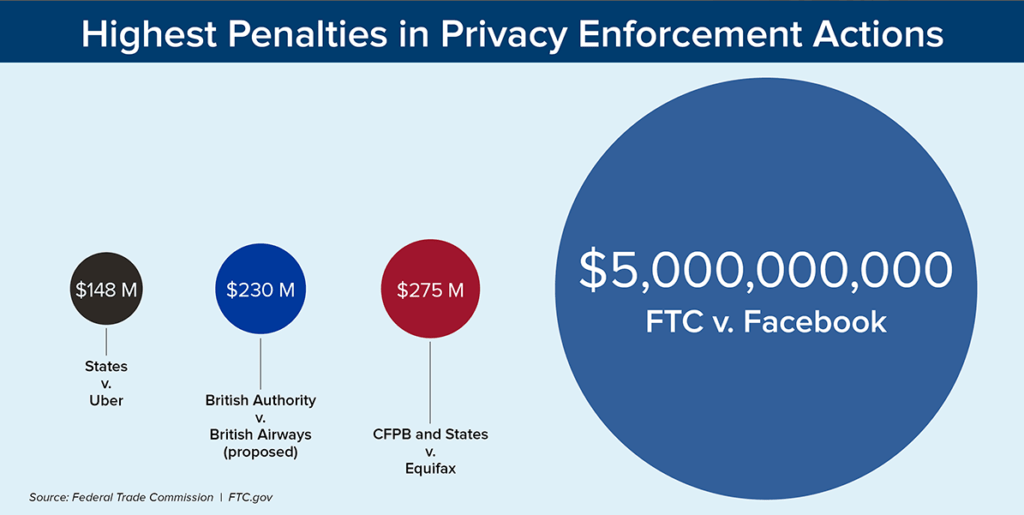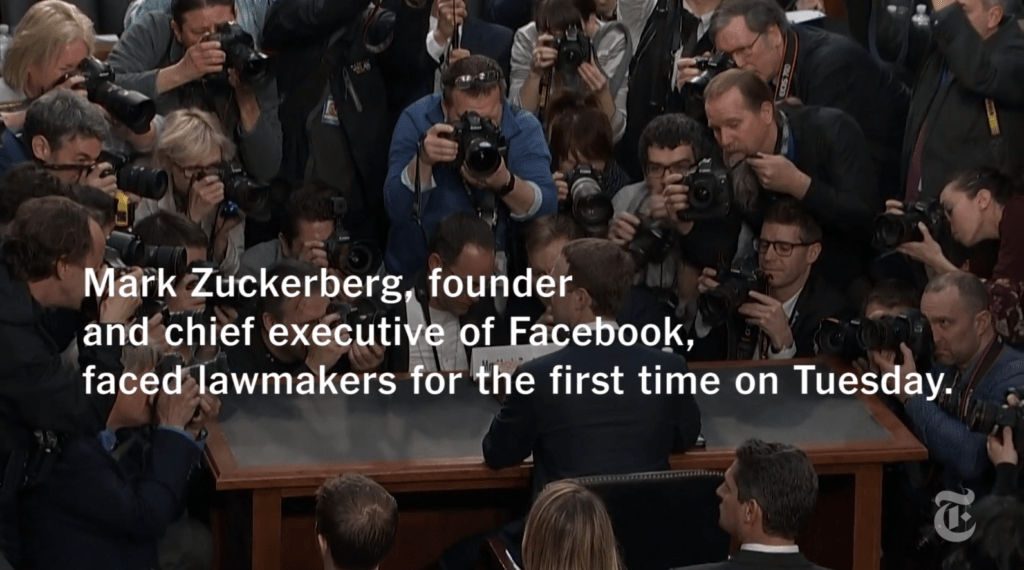Facebook to Pay $5 Billion in Fines in FTC Settlement and Agrees to New Privacy Restrictions

Facebook is in the news once again. According to the Business Insider “Facebook is about to get slapped with a $5 billion fine by the Federal Trade Commission because of the Cambridge Analytica scandal, where data from over 50 million users was used without permission.” The Business Insider called this to be “the biggest scandal in the company’s history.” This Federal Trade Commission (FTC) settlement seems to be a huge win for Facebook and the Wall Street has also reacted positively to this news.
Highest Penalty for Privacy Violations
According to FTC Chairman Joe Simons. “The magnitude of the $5 billion penalty and sweeping conduct relief are unprecedented in the history of the FTC. The relief is designed not only to punish future violations but, more importantly, to change Facebook’s entire privacy culture to decrease the likelihood of continued violations. The Commission takes consumer privacy seriously, and will enforce FTC orders to the fullest extent of the law.”First of all, FTC can’t really enforce its orders. According to the FTC, Facebook has already violated its previous orders in the past (see next paragraph) so what’s FTC going to do if Facebook violates its orders again? Not much really. Even if Facebook is fined $50 billion dollars, it won’t be a deterrent for it at all.
How Facebook Violated Users’ Privacy
This FTC settlement is a 20-year order, so technically it will prevent Facebook from violating people’s privacy for the next 20 year. Does anyone actually believes that? FTC is alleging that Facebook violated the 2012 FTC order because they have “repeatedly used deceptive disclosures and settings to undermine users’ privacy preferences.” To better understand Facebook’s level of deception and disregard for its members’ privacy, as alleged by FTC, you have to read the FTC filing. FTC has essentially indicated that Facebook designed their platform to trick people and made it difficult for them to go through the hoops to opt out of some of the privacy settings. The complaint alleges that going as far back as 2010, when a user installed an app, the default settings not only shared the App User’s data with third-party developer, but also the App User’s Facebook friends, even if the friends never installed the app. FTC believes that, in the wrong hands, the App User’s and their friends data could be used for many cybercrimes, such as phishing, fraud, and identity theft. Because Facebook is only interested in profiting from selling people’s personal data (as FTC has alleged in its filing), they don’t seem to care what the developers might do with its members’ data.
According to FTC “To encourage users to share information, Facebook promises users that they can control the privacy of their information through Facebook’s privacy settings. However, through at least June 2018, Facebook subverted users’ privacy choices to serve its own business interests.”
| Using a social networking site and expecting privacy is like taking a shower and expecting to stay dry. |
History of Privacy Violations
Facebook is used to paying fines for privacy violations and breaking laws. This is their modus operandi. This year Facebook decided to set aside $3 billion to pay for the penalty and had told its investors that the amount could be as high as $5 billion.
Here is a small sample of Facebook activities related to privacy violations and data breach.
- In a 2012 Class Action Law Suit, Facebook was blamed for violating the federal wiretap laws. Facebook was tracking its members even when they completely logged out of their Facebook account.
- Apparently tracking its own members without their knowledge wasn’t enough so Facebook decided to start tracking non-members, as reported in this article Facebook begins tracking non-users around the Internet.
- Facebook has used its members in a psychological test as human guinea pigs without their permission and also used people’s location data to serve its purpose, which Facebook first denied and then backtracked, as reported in this Forbes article Facebook Is Playing Games With Your Privacy And There’s Nothing You Can Do About It.
- In addition to collecting all the personal data of its members for years, Facebook came up with an idea to gather even more confidential data from its members. Facebook decided to start asking people for their government IDs, such as passport, driver’s license, state-issued ID card, military ID card, and immigration ID with signature. This practice has continued in 2019.
- PC World reported that a hacker stole 1.5 million Facebook accounts and was selling usernames and passwords in an underground hacker forum for $25-$45 per 1,000 accounts. Although Symantec found that the rate was more like $1 to $20 per account.
In its article Mark Zuckerberg has lost all credibility with Congress — and the rest of us, CNN’s Kara Alaimo points out how Mark Zuckerberg lied to the lawmakers during the 2018 congressional hearing. She said, “misleading senators could turn out to be one of the dumbest and most damaging things the social network with an impressive history of blunders has ever done.” She went on to say, “Zuckerberg has put himself in a vulnerable position. It can be a federal crime to lie to Congress.”
Facebook’s behavior isn’t something new. CNN pointed out last year that “the latest revelations also suggest something more sinister: that the social network could be intentionally deceiving people.” However, Facebook’s deception and violations of privacy are old news. Facebook was founded in 2004 and Mark Zuckerberg has been on an apology tour ever since. Wired wrote an article on Why Zuckerberg’s 14-Year Apology Tour Hasn’t Fixed Facebook. The author explained how Mark Zuckerberg was apologizing for his actions at Harvard a year before he founded Facebook. The trend continued from 2004 until 2018 when the article was written. For a more detailed catalog of Facebook’s blunders, check out Jessi Hempel’s article A Short History of Facebook’s Privacy Gaffes.
| With other Internet sites you have to worry about hackers stealing your data for financial gains, with Facebook you have to worry about Facebook violating your privacy for its own business interests. |
Would the Penalty Change Facebook’s Behavior?
Facebook has been blamed for privacy violations so often, people aren’t even fazed by it. Just the fact that Facebook has over 2 billion users proves my point. Federal regulators continue to impose fines, Facebook continues to pay the fines, and continues to break the law. That’s the way it was before, that’s the way it is today, and you can bet all the tea in China that’s the way it would be in the future, unless the authorities, such as the U.S. Congress, FTC, or another oversight body decides to get serious and take some concrete actions. A small penalty of $5 billion isn’t enough to ruffle Facebook’s feathers. Facebook is expected to announce that it made $16 billion in Q2 2019, which means $5 billion is less than one month’s revenue for Facebook. Certainly not enough to change Facebook’s behavior.
The FTC and the U.S. Congress is well aware of Facebook’s long history of privacy violations, but hasn’t really done much about it. Facebook is glad to pay these piddly $5 billion fines because it’s just a cost of doing business for them. A lot of people, including many privacy advocates and consumer groups, are unhappy with the amount of penalty and want Congress to intervene. According to The Hill, the criticism of the settlement is bipartisan (Critics slam $5 billion Facebook fine as weak). There have been many calls for breaking up Facebook. Inc Magazine’s article Why Facebook’s Biggest Problem Isn’t Fake News or Privacy. It’s Mark Zuckerberg makes the point that “Mark Zuckerberg is a true believer. That’s certainly a valuable quality in a founder, but unfortunately, it means he genuinely doesn’t get it. He genuinely doesn’t understand why people are so concerned about privacy, or fake news, or being stalked around the internet.” Inc Magazine also pointed out that “According to Facebook’s most recent SEC filing, almost 68 percent of outside investors voted to remove Zuckerberg as Chairman.”
The following video from New York Times sheds some light on Facebook and Mark Zuckerberg. These highlights are from the 2018 congressional hearing.
NOTE: If you don’t hear any sound, click the speaker icon in the lower right corner inside the video to unmute the audio.
Dissenting Statement from a Commissioner
Rebecca Kelly Slaughter is one of the FTC commissioners. She makes a very compelling case against the FTC decision that’s worth reading. Rather than being a boring legal document, you will find her statement to be interesting. The Dissenting Statement of Commissioner Rebecca Kelly Slaughter expresses her opinion of allegations of continuous law violations by Facebook, which include deceptive privacy settings, using phone numbers to serve ads when their purpose was to secure user accounts, failure to secure user data from third-parties, and lying to users by telling them their facial technology was off by default (it wasn’t). Rebecca Slaughter would have preferred a litigation over a settlement. She said, “Rather than accepting this settlement, I believe we should have initiated litigation against Facebook and its CEO Mark Zuckerberg.”
Who thinks this $5 billion penalty on Facebook is a great deal? Well, Facebook is very pleased with the proposed FTC settlement and so is Wall Street. After the announcement, Facebook’s stock went up 1%, which means Mark Zuckerberg made over $1 billion in 30 minutes. If you think that’s impressive, it’s not. On July 27, 2016, Marck Zuckerberg made $3.4 billion in an hour. A $5 billion penalty may be a deterrent for smaller companies, but it is unlikely to change Facebook’s behavior. However, if The Wall Street Journal’s report about Facebook Settlement Requires Mark Zuckerberg to Certify Privacy Protections is accurate, it may make a difference. We don’t know yet if that’s for sure, but Wall Street Journal is reporting that the “Deal with Federal Trade Commission opens chief executive to potential liability for noncompliance”.
We should keep one thing in mind. The FTC order is not indefinite. It will expire after 20 years. But that’s not the best news for Facebook. If you read the Liability Release section on page 14 of the Dissenting Statement of Commissioner Rebecca Kelly Slaughter, you would know why Mark Zuckerberg and other executives should throw a big party to celebrate this $5 billion FTC settlement.
References Used
- The FTC has approved a roughly $5 billion settlement with Facebook
- Cambridge Analytica collected personal information from 50 million Facebook users without permission
- FTC Filing – United States of America vs. Facebook, Inc.
- Facebook begins tracking non-users around the Internet
- Facebook Is Playing Games With Your Privacy And There’s Nothing You Can Do About It
- 1.5 Million Stolen Facebook IDs up for Sale
- Mark Zuckerberg has lost all credibility with Congress — and the rest of us
- Why Zuckerberg’s 14-Year Apology Tour Hasn’t Fixed Facebook
- A Short History of Facebook’s Privacy Gaffes
- Critics slam $5 billion Facebook fine as weak
- Why Facebook’s Biggest Problem Isn’t Fake News or Privacy. It’s Mark Zuckerberg
- Facebook’s most recent SEC filing
- Dissenting Statement of Commissioner Rebecca Kelly Slaughter
- Mark Zuckerberg actually got $1 billion richer following the news of Facebook’s $5 billion fine for the biggest scandal in the company’s history (FB)
- Facebook CEO Mark Zuckerberg Gains $3.4 Billion In An Hour After Positive Second-Quarter Earnings
- Facebook Settlement Requires Mark Zuckerberg to Certify Privacy Protections
- A Short History of Facebook’s Privacy Gaffes
I would love to hear what you think about the recent FTC penalty. Do you think a $5 billion fine is a reasonable penalty for Facebook’s biggest scandal in the company’s history? Will Facebook stop violating people’s privacy after this settlement? If not, what do you think should be done to protect people’s privacy?
| Thanks for reading my article. If you are interested in IT training & consulting services, please reach out to me. Visit ZubairAlexander.com for information on my professional background. |
Copyright © 2019 SeattlePro Enterprises, LLC. All rights reserved.




